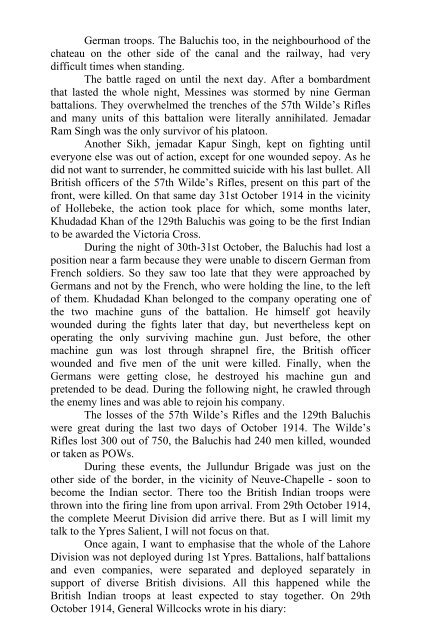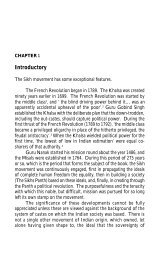HOW EUROPE IS INDEBTED TO THE SIKHS ? - Global Sikh Studies
HOW EUROPE IS INDEBTED TO THE SIKHS ? - Global Sikh Studies
HOW EUROPE IS INDEBTED TO THE SIKHS ? - Global Sikh Studies
Create successful ePaper yourself
Turn your PDF publications into a flip-book with our unique Google optimized e-Paper software.
German troops. The Baluchis too, in the neighbourhood of the<br />
chateau on the other side of the canal and the railway, had very<br />
difficult times when standing.<br />
The battle raged on until the next day. After a bombardment<br />
that lasted the whole night, Messines was stormed by nine German<br />
battalions. They overwhelmed the trenches of the 57th Wilde’s Rifles<br />
and many units of this battalion were literally annihilated. Jemadar<br />
Ram Singh was the only survivor of his platoon.<br />
Another <strong>Sikh</strong>, jemadar Kapur Singh, kept on fighting until<br />
everyone else was out of action, except for one wounded sepoy. As he<br />
did not want to surrender, he committed suicide with his last bullet. All<br />
British officers of the 57th Wilde’s Rifles, present on this part of the<br />
front, were killed. On that same day 31st October 1914 in the vicinity<br />
of Hollebeke, the action took place for which, some months later,<br />
Khudadad Khan of the 129th Baluchis was going to be the first Indian<br />
to be awarded the Victoria Cross.<br />
During the night of 30th-31st October, the Baluchis had lost a<br />
position near a farm because they were unable to discern German from<br />
French soldiers. So they saw too late that they were approached by<br />
Germans and not by the French, who were holding the line, to the left<br />
of them. Khudadad Khan belonged to the company operating one of<br />
the two machine guns of the battalion. He himself got heavily<br />
wounded during the fights later that day, but nevertheless kept on<br />
operating the only surviving machine gun. Just before, the other<br />
machine gun was lost through shrapnel fire, the British officer<br />
wounded and five men of the unit were killed. Finally, when the<br />
Germans were getting close, he destroyed his machine gun and<br />
pretended to be dead. During the following night, he crawled through<br />
the enemy lines and was able to rejoin his company.<br />
The losses of the 57th Wilde’s Rifles and the 129th Baluchis<br />
were great during the last two days of October 1914. The Wilde’s<br />
Rifles lost 300 out of 750, the Baluchis had 240 men killed, wounded<br />
or taken as POWs.<br />
During these events, the Jullundur Brigade was just on the<br />
other side of the border, in the vicinity of Neuve-Chapelle - soon to<br />
become the Indian sector. There too the British Indian troops were<br />
thrown into the firing line from upon arrival. From 29th October 1914,<br />
the complete Meerut Division did arrive there. But as I will limit my<br />
talk to the Ypres Salient, I will not focus on that.<br />
Once again, I want to emphasise that the whole of the Lahore<br />
Division was not deployed during 1st Ypres. Battalions, half battalions<br />
and even companies, were separated and deployed separately in<br />
support of diverse British divisions. All this happened while the<br />
British Indian troops at least expected to stay together. On 29th<br />
October 1914, General Willcocks wrote in his diary:

















